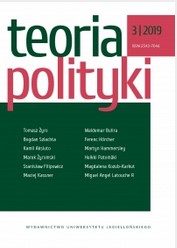Neofunkcjonalny paradygmat elitystyczny – możliwości i warunki pogodzenia elity i demokracji
The So-Called Neofunctional Elitist Paradigma as the Example of Convergence between Elite and Democracy
Author(s): Marek ŻyromskiSubject(s): Political Philosophy, Social Philosophy, Social Theory
Published by: Wydawnictwo Uniwersytetu Jagiellońskiego
Keywords: neofunctional elitist paradigm; divided elites; elite settlements; ideological unified elites; consensually unified elites;
Summary/Abstract: The so-called neofunctional elitist paradigm forms the newest (although have been developed since the middle of 1970s) version of theory of elite. Nevertheless, the theory of elite originated in the end of 19th century in sharp conflict with the democratic political system. The Italian “founding fathers” of the theory of elite (mainly Gaetano Mosca and Vilfredo Pareto) opposed some ideas of introducing the universal suffrage and moreover used the deep dissatisfaction connected with the process of unification of Italy (the process of Risorgimento). Already in 1928 Polish scholar Czesław Znamierowski presented some conditions of convergence between the necessity of elite and the existence of democratic political system. In the view of some chief proponents of the so-called neofunctional elitist paradigm (mainly John Higley) some features of the elite forms an important criterion in the classification of democratic political systems. Even nowadays the most popular on the world scene are the divided elites. In such the situation the most important elite groups that function in the given society cannot get to cooperation or compromise even in the basic political questions. Undoubtedly, much better situation is the possibility of cooperation between elites (or at least between the most important elites). Such the cooperation can be based on the common ideology (the so-called ideological unified elites), like in the totalitarian political system. On the other hand, the best situation can be achieved when such the cooperation between elites is based on some values of democratic order (like in consensually unified elites). Already 30 years ago in Poland during the Round Table negotiations such the compromise had been achieved – in process of the so-called elite settlements.
Journal: Teoria Polityki
- Issue Year: 2019
- Issue No: 3
- Page Range: 75-102
- Page Count: 28
- Language: Polish

